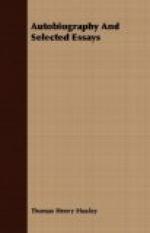I suppose your first action, assuming that you are a man of ordinary common sense, and that you have established this hypothesis to your own satisfaction, will very likely be to go off for the police, and set them on the track of the burglar, with the view to the recovery of your property. But just as you are starting with this object, some person comes in, and on learning what you are about, says, “My good friend, you are going on a great deal too fast. How do you know that the man who really made the marks took the spoons? It might have been a monkey that took them, and the man may have merely looked in afterwards.” You would probably reply, “Well, that is all very well, but you see it is contrary to all experience of the way tea-pots and spoons are abstracted; so that, at any rate, your hypothesis is less probable than mine.” While you are talking the thing over in this way, another friend arrives, one of the good kind of people that I was talking of a little while ago. And he might say, “Oh, my dear sir, you are certainly going on a great deal too fast. You are most presumptuous. You admit that all these occurrences took place when you were fast asleep, at a time when you could not possibly have known anything about what was taking place. How do you know that the laws of Nature are not suspended during the night? It may be that there has been some kind of supernatural interference in this case.” In point of fact, he declares that your hypothesis is one of which you cannot at all demonstrate the truth, and that you are by no means sure that the laws of Nature are the same when you are asleep as when you are awake.




